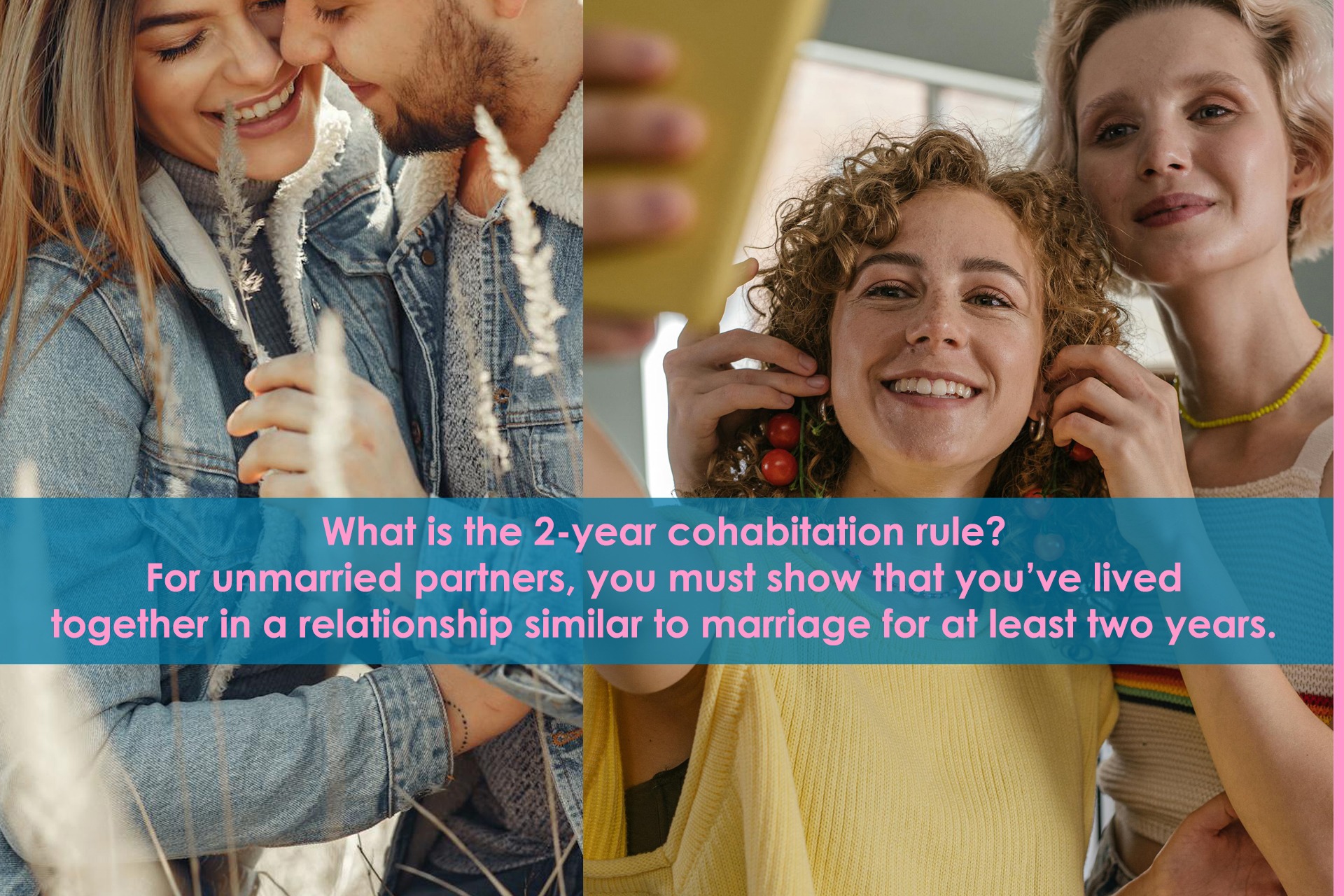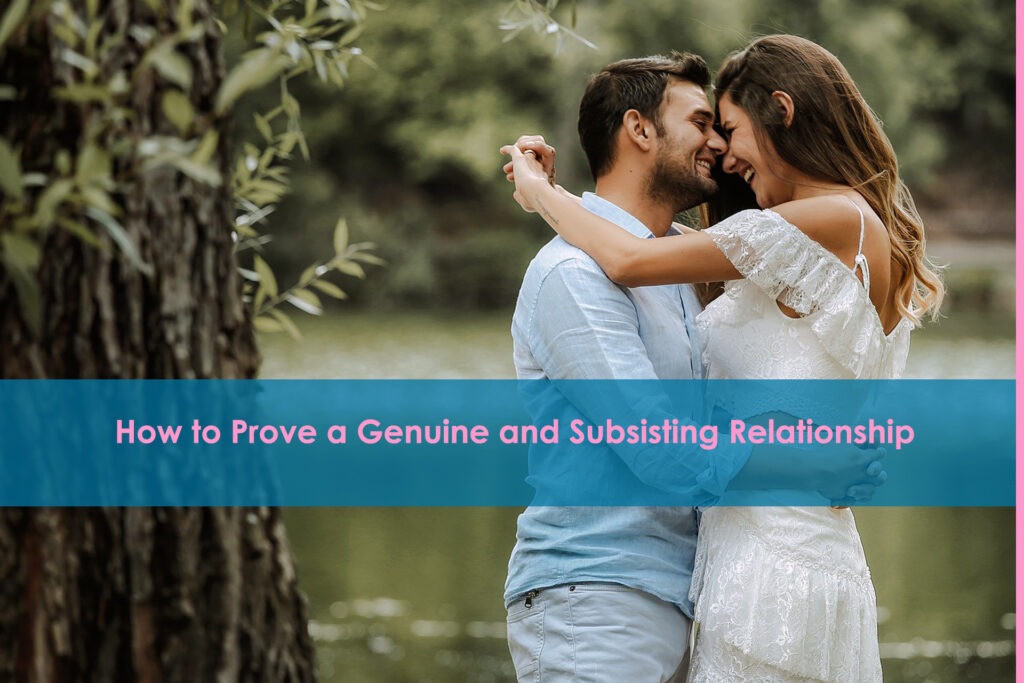Applying for a UK spouse visa is an exciting step for couples wanting to build a life together in the UK but it can also feel overwhelming. One of the most crucial elements of your application is proving that your relationship is genuine and subsisting. The Home Office examines this requirement carefully, and insufficient evidence or unclear documentation can lead to visa refusal even if your relationship is genuine.
What does “genuine and subsisting” even mean is a question we hear from couples all the time. This guide explains what the Home Office looks for, the types of evidence you can provide, and practical tips to make your application as strong as possible. Whether you’re married, in a civil partnership, or applying as an unmarried partner, this article answers common questions and offers guidance.
What Does “Genuine and Subsisting Relationship” Mean?
A genuine and subsisting relationship is one where both partners are emotionally committed, financially connected, and invested in each other’s lives. The Home Office wants to be confident that your relationship is authentic, ongoing, and not just a means to obtain a visa.
Some of the key factors considered by immigration officers:
- Emotional commitment: Do you support each other emotionally, and do you know each other well?
- Financial interdependence: Do you share bills, joint accounts, or contribute to each other’s living costs?
- Cohabitation: Do you live together, or is there a reasonable explanation if you don’t?
- Relationship history: How long have you been together, and is there evidence supporting your timeline?
The Home Office does not expect perfection relationships are complex. The key is to show stability, commitment, and authenticity.
How to Prove a Genuine and Subsisting Relationship for UK Spouse Visa?
Proving your relationship involves providing evidence of your emotional, financial, and social connection. While there’s no strict checklist, certain types of evidence consistently strengthen applications:
1. Communication Records
Regular communication demonstrates commitment:
- Emails, texts, WhatsApp chats, or social media messages.
- Video calls or phone call logs, especially for long-distance couples.
- Letters or cards exchanged over time.
Tip: Arrange communications chronologically to show ongoing contact. Highlight significant conversations, like planning trips, discussing finances, or life events.
2. Financial Evidence
Sharing financial responsibilities demonstrates partnership:
- Joint bank accounts or savings.
- Proof of financial support, such as money transfers.
- Shared bills, insurance policies, or household expenses.
Even if you manage finances separately, showing mutual support strengthens your case.
3. Travel and Visits
Evidence of visiting each other is particularly important for long-distance couples:
- Flight tickets, travel itineraries, and boarding passes.
- Accommodation bookings showing shared stays.
- Photos from trips or social events.
Tip: Include captions with dates and locations for photos it helps immigration officers understand context, don’t forget they are forming a picture of your relationship to see if its genuine and subsisting.
4. Living Together Evidence
For cohabiting couples, proving shared residence is key:
- Joint tenancy agreements or mortgage documents.
- Utility bills or council tax statements addressed to both partners.
- Statements from friends, family, or landlords confirming cohabitation.
- Evidence of shared household responsibilities.
Documents Needed to Prove Relationship in the UK
While each case is unique, common documents include:
- Marriage or civil partnership certificate (for married applicants).
- Joint bank statements covering at least six months.
- Utility bills, council tax, or tenancy agreements in both names.
- Photos together over time, ideally including friends or family.
- Travel records showing visits if living apart.
- Communication evidence: emails, calls, messages, or social media.
- Affidavits or letters from friends or family confirming the relationship.
- Financial evidence: joint bills, insurance, or proof of support.

How to Prove Unmarried Partner Status
For unmarried partners, you must demonstrate that you’ve lived together in a relationship akin to marriage for at least two years, this is often referred to as the “2-year cohabitation rule.”
Evidence may include:
- Joint tenancy agreements or mortgage documents.
- Letters addressed to both partners.
- Shared utility bills, council tax, or household expenses.
- Statements from family or friends confirming cohabitation.
- Photos and records showing life together over time.
If you’ve lived apart temporarily, explain why and provide evidence of ongoing contact and visits.
Does Immigration Check If You Live Together?
Yes. Immigration officers will scrutinise cohabitation, especially for unmarried partners. While home visits are rare, officers may:
- Examine documents for consistency in addresses and names.
- Ask questions about living arrangements during interviews.
- Consider supporting evidence from third parties, such as landlords or family.
How to prove cohabiting in the UK:
- Provide official documents with both names at the same address.
- Maintain a clear timeline of shared residence.
- Include evidence of shared responsibilities like utility or council tax bills.
What If You Cannot Live Together?
Some couples cannot cohabit due to work, study, or family obligations. The Home Office still allows applications if the relationship is genuine, but evidence must reflect ongoing commitment:
- Regular communication via calls, messages, or emails.
- Travel and visit documentation.
- Written explanations detailing why cohabitation isn’t possible.
- Financial support or evidence of shared life plans.
Tip: Immigration solicitors’ advice a clear, structured cover letter explaining your situation can significantly strengthen your application.
Additional Tips for a Strong UK Spouse Visa Application
- Be thorough: Submit as much relevant evidence as possible.
- Organise documents clearly: Use folders, timelines, or tables of contents.
- Avoid discrepancies: Ensure names, dates, and addresses match across all documents.
- Explain gaps: Address long-distance periods or breaks in communication.
- Prepare for interviews: Know your relationship timeline, shared responsibilities, and future plans.
- Keep originals safe: Immigration officers may request them at appointments.
- Consult an Immigration lawyer: This is where immigration lawyers and solicitors come in, an immigration professional can guide you through the complex UK spouse visa process, helping you gather the right evidence, organise your application, and avoid mistakes that could lead to refusal. They provide expert advice tailored to your situation, giving you confidence and peace of mind throughout the process.
How Immigration Lawyers and Solicitors Can Help
Applying for a UK spouse visa can feel overwhelming, particularly when proving a genuine relationship. Immigration lawyers and solicitors act as guides, strategists, and advocates, helping couples navigate complex rules with confidence, here are 6 reasons why!
1. Assessing Your Evidence
Solicitors review your relationship history, living arrangements, and financial situation to identify:
- Which documents are most persuasive.
- Gaps or inconsistencies that could raise concerns.
- Additional evidence that could strengthen your case.
This ensures your application is comprehensive and coherent, presenting a clear picture of your relationship.
2. Organising and Presenting Documents
Even strong evidence can be overlooked if disorganised. Immigration lawyers help:
- Categorise documents by type (financial, cohabitation, travel, communication).
- Prepare a timeline or cover letter summarising your relationship and evidence.
- Ensure submissions are clear, readable, and professional.
3. Addressing Complex Relationship Scenarios
Immigration solicitors assist with challenging situations such as:
- Unmarried or long-distance partners.
- Temporary separations due to work, study, or family.
- Mixed-nationality couples with documents in different languages.
- Couples without joint financial documents.
They know which alternative evidence is acceptable, reducing risk of refusal.
4. Drafting Supporting Statements
A compelling statement can make a huge difference. Immigration lawyers:
- Draft personal statements explaining your relationship timeline and shared responsibilities.
- Prepare cover letters summarising key documents.
- Advise on presenting long distance or complex scenarios persuasively.
5. Minimising Risk of Refusal
Solicitors review applications to prevent errors or inconsistencies that could lead to refusal, ensuring compliance with latest Home Office guidance. They also provide advice for applicants with previous refusals or complex immigration histories.
6. Ongoing Support
Immigration lawyers support applicants throughout the process:
- Responding to Home Office queries.
- Assisting with additional document requests.
- Representing you in appeals or administrative reviews if needed.
Working with a solicitor provides reassurance and increases the likelihood of a successful outcome.
📂 Document Checklist for Proving a Genuine Relationship
| Category | Examples of Documents | Tips |
|---|---|---|
| Marriage / Civil Partnership | Marriage certificate, civil partnership certificate | Required for married applicants. |
| Cohabitation / Living Together | Tenancy agreements, mortgage documents, utility bills, council tax letters | For unmarried partners, show at least 2 years’ cohabitation; include a timeline if you moved frequently. |
| Financial Evidence | Joint bank accounts, joint savings, shared bills, evidence of financial support | Even if finances are separate, show contributions or support to each other. |
| Travel & Visits | Flight tickets, hotel bookings, travel itineraries, photos from trips | Label photos with dates and locations; highlight joint trips. |
| Communication | Emails, text messages, WhatsApp chats, call logs, social media messages | Arrange chronologically; highlight significant conversations. |
| Supporting Statements | Letters from family, friends, or landlords confirming your relationship | Dated and signed; official stationery if possible. |
| Additional Evidence | Photos together, invitations, shared memberships, shared insurance | Anything showing a shared life—home, social, or work-related. |
Frequently Asked Questions (FAQs)
1. How can I prove my relationship to immigration?
Provide evidence of emotional, financial, social connections and joint accounts, communication records, photos, travel evidence, and cohabitation proof. A cover letter summarising these strengthens your case.
2. What can I use as proof of a relationship?
Marriage certificates, joint tenancy agreements, utility bills, bank statements, photos, travel documents, and letters from friends / family.
3. What is the 2-year cohabitation rule?
For unmarried partners, you must show that you’ve lived together in a relationship similar to marriage for at least two years.
4. How can I prove my unmarried partner status?
Provide evidence of living together for at least two years, financial contributions, communication records, and supporting letters from family or friends.
5. Does immigration check if you live together?
Yes. Officers may scrutinise documents and ask questions in interviews. Home visits are rare but possible. Provide clear, consistent cohabitation evidence.
6. How can I prove someone is cohabiting in the UK?
Joint tenancy / mortgage documents, utility bills, council tax letters, and statements from landlords or family help. Evidence of shared responsibilities strengthens your case.
Final Thoughts
Proving a genuine and subsisting relationship is a vital part of any UK spouse visa application. Whether married or unmarried, providing detailed, clear, and organised evidence is essential. From financial documents and communication records to cohabitation and travel proof, every piece of evidence strengthens your case.
If you are unsure which documents to include, how to structure them, or how to explain unique circumstances, consulting a professional immigration solicitor can make a significant difference. With careful preparation, guidance, and support, you can maximise your chances of approval and focus on building your life together in the UK.
About the Author: Mulgrave Law
Mulgrave Law is a London-based immigration law firm specialising in spouse and family visas, skilled worker routes, settlement, and British citizenship. Our solicitors guide individuals and families across the UK, helping them navigate complex immigration rules with clear, practical advice. We assist clients in preparing evidence, structuring applications, and presenting relationships in the strongest possible way. Known for meticulous preparation and solution-focused guidance, Mulgrave Law ensures peace of mind and increases the likelihood of a successful visa application.
Book a consultation with our experts today.
Call 02072537248 or email us on info@mulgravelaw.co.uk, alternatively click on
Contact Us to fill our basic form.

